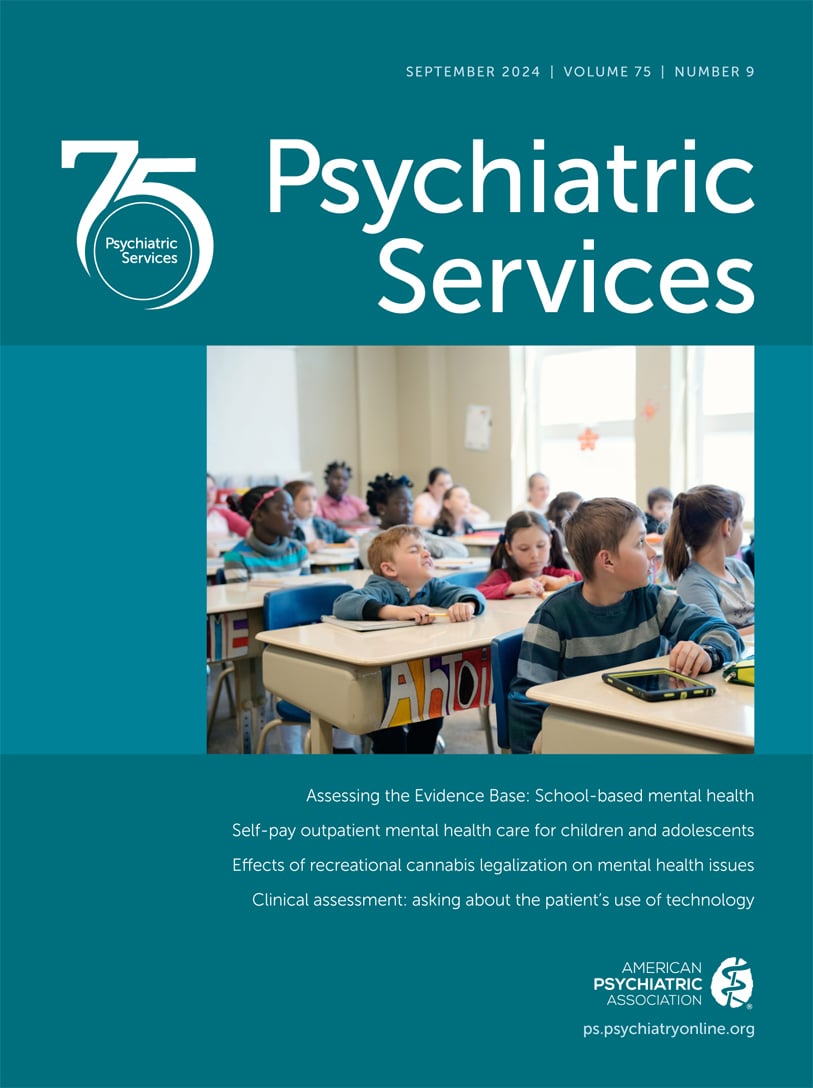Psychiatric Services
- Volume 46
- Number 10
- October 1995
Publication date: 01 October 1995
Pages1019–1026This paper describes a successful day treatment program that provides four months of intensive psychodynamic group-oriented milieu treatment for patients with long-standing personality disorders, who commonly experience recurrent major depression, ...
https://doi.org/10.1176/ps.46.10.1019Publication date: 01 October 1995
Pages1026–1031OBJECTIVES: State psychiatric hospitals across the U.S. were surveyed to develop national normative data on the incidence of seclusion and restrain and of injuries to patients and staff resulting from aggression by patients. METHODS: A survey instrument ...
https://doi.org/10.1176/ps.46.10.1026Publication date: 01 October 1995
Pages1032–1037OBJECTIVE: The authors examined rates of use restraint and seclusion during September 1992 in 125 psychiatric settings in New York State. METHODS: Psychiatric centers and general hospitals with psychiatric services were surveyed by mail about use of ...
https://doi.org/10.1176/ps.46.10.1032Publication date: 01 October 1995
Pages1037–1044OBJECTIVE: The study examined whether employing mental health consumers as peer specialists in an intensive case management program can enhance outcomes for clients with serious mental illness. METHODS: A quasiexperimental, longitudinal, nonequivalent ...
https://doi.org/10.1176/ps.46.10.1037Publication date: 01 October 1995
Pages1045–1048Involuntary civil commitment in managed care settings may create conflicts between providers and payers. Providers may determine that a patient, particularly one who presents a risk to self or others, must be confined beyond the period reimbursed by the ...
https://doi.org/10.1176/ps.46.10.1045Publication date: 01 October 1995
Pages1049–1054OBJECTIVE: This preliminary study assessed the effects on outpatient medication compliance of converting inpatients with schizophrenia from oral to depot neuroleptic medication. METHODS: Subjects consisted of 93 neuroleptic-responsive inpatients with ...
https://doi.org/10.1176/ps.46.10.1049Publication date: 01 October 1995
Pages1055–1060OBJECTIVE: To increase understanding of decisions about inpatient admission, a four-step algorithm was used to examine 2,073 consecutive visits to a public hospital psychiatric emergency room, 684 of which resulted in admission. METHODS: Admission ...
https://doi.org/10.1176/ps.46.10.1055Article
Publication date: 01 October 1995
Pages1069–1071A total of 167 Department of Veterans Affairs medical centers responded to a survey that sought information on suicidal behavior during a one- year period among patients in inpatient or outpatient treatment. Of 248 completed suicides during the period, ...
https://doi.org/10.1176/ps.46.10.1069Publication date: 01 October 1995
Pages1071–1073Fifty-four persons with serious mental illness who were living below the poverty line were randomly divided into two groups. Members of one group received allowances and forgivable loans to raise them above the poverty line for one year. The others ...
https://doi.org/10.1176/ps.46.10.1071Publication date: 01 October 1995
Pages1074–1075Of 195 patients admitted to a state hospital over a four-month period, 74 were multiple recidivists. Nearly half of the 195 patients could be assigned to one of six profile subgroups of recidivists described in a previous study. Because of the high rate ...
https://doi.org/10.1176/ps.46.10.1074Publication date: 01 October 1995
Pages1076–1078The attendance of 112 patients referred to an outpatient psychiatric rehabilitation program was retrospectively examined, and characteristics of dropouts were compared with those of patients who remained in treatment during the first eight weeks. ...
https://doi.org/10.1176/ps.46.10.1076Article
Past Issues
View Issues Archive
Vol. 75 | No. 12

Vol. 75 | No. 11

Vol. 75 | No. 10
